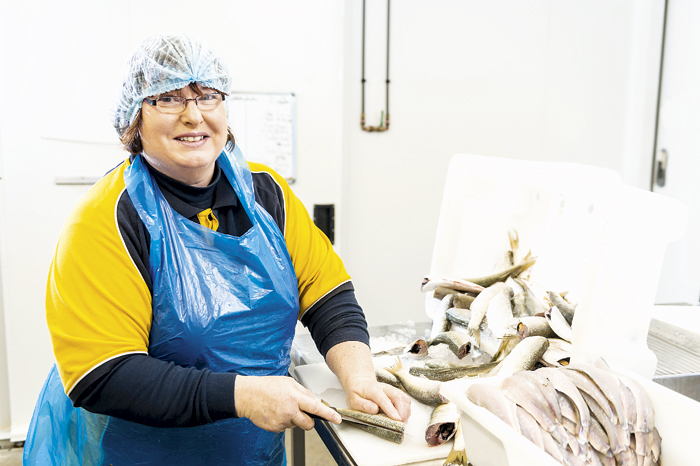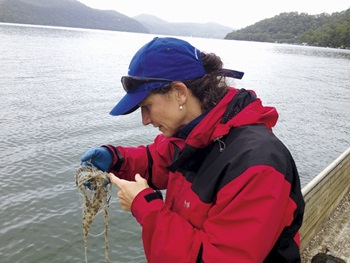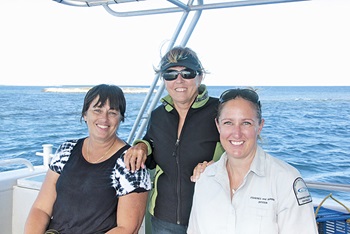Women in the seafood industry are significant powerbrokers and influencers, a fact that often goes unnoticed
 Tracy Hill is committed to supporting and raising the profile of women in the fishing industry.
Tracy Hill is committed to supporting and raising the profile of women in the fishing industry. Photo: Tom Rosch
By Ilaria Catizone
While Coorong fisher Glen Hill starred in front of the camera and ultimately on the front cover of the FRDC’s own FISH magazine, hauling in the nets, his business partner and wife, Tracy, was holding the light for the photographer.
The situation was, Tracy Hill says, a reflection of the low profile that women in the seafood industry have, despite the vital role they often play in keeping the industry afloat.
But she says more women are stepping into the spotlight to take on the political and promotional challenges, and ensure the future of their industry.
Her own entree into the fishing industry began when, as a bank manager in the Coorong region of South Australia, she approved a credit card for a customer who was looking to upgrade the fishing equipment he had just bought along with his fishing licence, little realising that he would become her husband.
She has since traded the banking business for fishing full time, as their fishing business took off.
And to help ensure the longevity and the social licence to fish in the region she was actively involved in efforts to secure the prestigious Marine Stewardship Council accreditation for the Lakes and Coorong Fishery in 2008.

 Top: Ana Rubio Inspecting some fouling from oyster baskets.
Top: Ana Rubio Inspecting some fouling from oyster baskets. Bottom: Working for the sustainable future of the Abrolhos Islands, (from left) Leonie Noble, marine scientist Jen Shaw, and Western Australian fisheries officer Rebecca Thomas.
“As well as the administration side of the business, I still fillet and wash the fish, pack and despatch the orders, and deliver fish to Adelaide twice a week. We have a farmers’ market stall and also attend food and wine festivals, where we cook our fish and promote the industry.Plus there are management meetings and various committees. I particularly love the variety of the work,” she says.
Tracy Hill was the first woman on the Southern Fishermen’s Association committee and has also initiated some changes to the constitution to make it easier for more women to participate.
Her commitment to supporting women in the industry, and to raising their profile, also led her to join the Women’s Industry Network Seafood Community (WINSC), which was established in the late 1990s.
She says one of the important roles of WINSC is to provide a professional community where women can exchange knowledge and experiences and alleviate the isolation they may sometimes feel.
This was the case for Karen Holder, who has worked with her husband in their Adelaide-based fishing business for 27 years. She provides the administration for the business and takes care of their children while he fishes for Blue Swimmer Crab (Portunus armatus).
“The flexibility of the work is the best part of the job: the worst part is keeping up with changing regulations,” she says.
But until she became involved with the WINSC, Karen Holder says she often felt quite isolated in her work, as there were few fishing families in the Adelaide region. Karen Holder is now the SA director for the network’s national committee.
For Leonie Noble, the desire to influence government decisions encouraged her to form the group Friends of Abrolhos in Western Australia and provided her first steps into the arena of fisheries management and politics.
When she moved to the Abrolhos Islands with her fisher husband and their three children in the early 1980s, she quickly realised that the industry needed a stronger voice in the fisheries management decisions.
“It all started with six women around my kitchen table,” Leonie Noble recalls.
They wanted the government to consider the social implications of its decisions, as well as the latest research. “So we started to make a noise about it.”
Eventually the Friends of Abrolhos became the go-to group for the local community on issues such as environmental closures and codes of conduct for stakeholder industries of the Abrolhos Islands. This level of involvement resulted in Leonie Noble being appointed to the Ministerial Advisory Committee for the Abrolhos.
At high-level departmental and Ministerial board meetings, Leonie Noble says she was often the only woman in the room. Initially, other attendees would assume she was there to make coffee or take the minutes.
She had to work hard to gain the respect of her peers, she says, but the effort has been worthwhile because it has allowed her to make a difference to government policies that affect the viability and sustainability of her community and industry.
As the vice-president of WINSC, Leonie Holder says the network can help young women starting out in the seafood industry to find a mentor who can support them through some of the industry’s challenges, and encourage their enthusiasm and passion.
Passion and commitment are exactly what has helped oyster researcher Ana Rubio gain acceptance among New South Wales oyster farmers when she first arrived from Europe more than a decade ago. At that time she was one of only a few women actively out on the water in the oyster leases. She says it took about six months for growers to start taking her seriously.
“I think it happened after a few days of heavy rain,” Ana Rubio says. “It was pouring and I was still there taking my samples. After that, they started asking for my opinion and assistance.”
She says that while the oyster industry appears, to the outsider, to be heavily male-dominated, things are changing. She sees a greater involvement of women, especially in the new businesses that are taken up by young couples, where both partners work together in all aspects of the farm.
| Position | Name | |
|---|---|---|
| President, NSW Director | Mary Howard | maryhoward29@bigpond.com |
| WA Director | Leonie Noble | coolimba@bigpond.com |
| NT Director | Marianne St Clair | marianne.stclair@batchelor.edu.au mariannestclair@yahoo.co.uk |
| ACT Director | Vacant | |
| SA Director | Karen Holder | dkholder@adam.com.au |
| Tasmanian Director | Mary Brewer | brewer.mary289@gmail.com |
| Victorian Director | Maria Manias | manias01@bigpond.com |
| Director at large | Eva Marinopoulous | sales@redcoralseafood.com.au |
| Director at large | Gaylene Newton | gaylene.newton@bigpond.com |
| Director at large | Julii Tyson | julii@hdbarra.com.au |
| Queensland Director | Anne Whalley | whalleysfishing@bigpond.com |
About the Women’s Industry Network Seafood Community
The Women’s Industry Network (WIN) was formed in 1996 by a group of women fishing in South Australia.
In 1998, the Women’s Industry Network Seafood Community (WINSC) developed into a national body, with organisations in each state.
WINSC is the only national organisation in Australia representing women in the seafood industry.
It is a unique network covering the tough, high-tech world of commercial fishing, cutting-edge aquaculture, research and processing sectors, and policy and resource management.
The objectives of WINSC are to:
- recognise and enhance the skills of seafood women;
- develop effective partnerships with government agencies and other industry stakeholders;
- take a professional approach to all activities and relationships with other stakeholders;
- create a supportive environment to ensure women of the fishing industry reach their potential;
- actively encourage the involvement of seafood women; and
- provide community education on all aspects of the seafood industry.
Wherever it works, WINSC builds the capacity of its seafood women to contribute to their industry.
Source: WINSC Website
FRDC Research Codes: 2008-332, 2008-333





